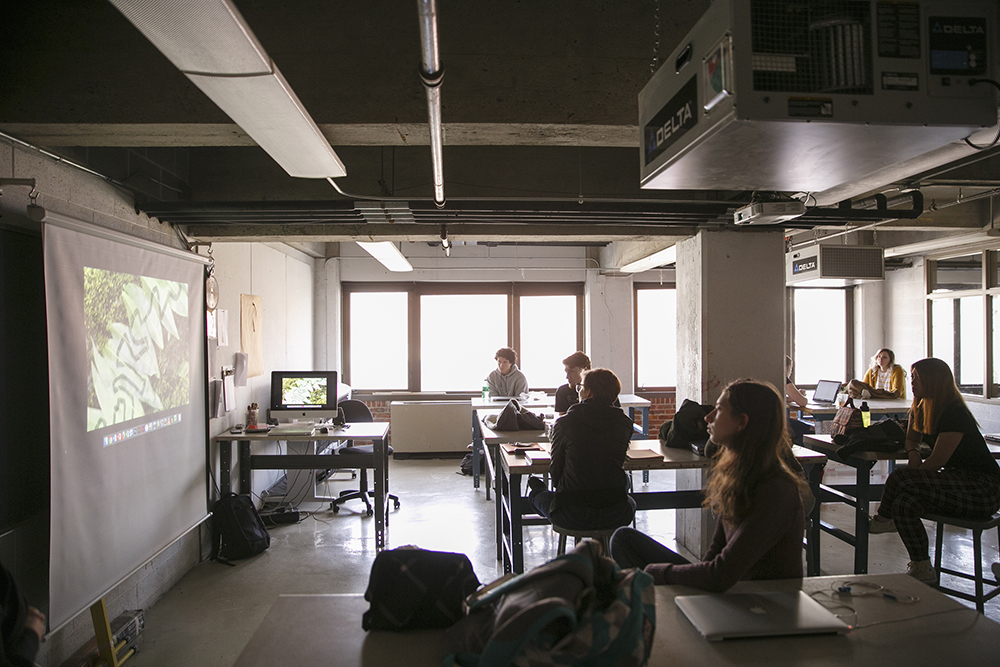
Art Support: Continuing Ed launches series that includes critiques, practical new skills
Monday, October 28th, 2019
“Where are all my people?”
— Every creative person, at some point
The creative life often starts as a constant inflow of ideas and feedback and collaboration, that jumble of inspiration and energy. But so much of a creative life in practice is solo — working on the next piece, or struggling over the stubborn detail — until you look around and wonder where that energy used to come from.
Maybe you were once inspired by critique sessions. Maybe it was the constant informal feedback provided by the structure of being in school. Maybe it simply was from the companionship and camaraderie of other artists, each on their own path but feeding into the creative flow.
If you’re missing that energy, PCA&D’s Continuing Education Department has a spark of a solution.
Meet Art Support, CE’s initiative to bring creatives together in a facilitated setting, so they can serve as audience, sounding boards, and feedback for each other.
“We’ve heard a lot of feedback from alumni and creatives,” says Natalie Lascek, Director of Continuing Education, who adds that Art Support is specifically designed to address their wishlist.
“It’s about finding ways to have bite-sized courses that are high-impact and get right to the root of what you want or need,” Lascek says.
Art Support’s first class centers around the critique: something many young art students first dread, then come to appreciate, then find they miss when they’re out of school. Art Support: Group Critique, facilitated by Beth Hacker, is scheduled for Wednesday, Jan. 15, 2020, from 6-9 pm. The fee is $15. There you and your classmates can “discuss your work and the work of others to gain a stronger understanding of audience perception and a clearer path forward in your creative production.”
Additional Art Support: Group Critique sessions, also led by Hacker, are on the calendar for March 11 and May 13. Both sessions, Lascek says, require only that the student bring at least one piece of art with them. Everyone will get time for critique, she says, but beyond that, “it’s all about how the conversations manifest themselves. You don’t have to be an ‘art school graduate’ to sign up, and Beth is excellent at guiding the conversation in a good framework. It’s really people giving their thoughts on the concept, the execution. You can take it, you can take part of it, you can leave it.” But, in the end, you have feedback that grants a new perspective on your project.
Practical skill-building
In addition to the critique classes, on Feb. 25 painter and sculptor Leah Limpert Walt will be teaching a three-hour, hands-on Art Support: Building Canvas Stretchers Workshop. Limpert Walt will tackle one approach to building a stable and reliable stretcher but cover others as the class members measure, cut, and build their own stretchers from scratch.
And finally, landscape and architectural photographer Dan Lobdell instructs the three-hour Art Support: How to Photograph Your Artwork class on April 8. Lascek says Lobdell aims to teach skills needed to produce high-quality photographs of artwork for documentary and promotional uses. No access to a highly professional camera setup? No worries. The class will cover equipment choice, camera settings, and lighting techniques that can be used with all types of equipment and facilities.
All of these short-format classes are high impact, designed to jump-start skills and conversations.
Lascek is excited to roll out these courses (registration for the whole Art Support series is open now), especially after hearing from others in the creative community that they miss or wish they had access to the expansion of ideas that good critiques and engagement with other creatives can provide. She’s excited also to bring professional instruction for more practical skills – like documenting artwork, or building a canvas stretcher – that not every creative person has attempted or they may need a refresher.
Plus, she says, the Art Support concept works well with recently established partnerships, such as that between the College and the make717 makerspace: Knowledge you gain from one source can be used to further your work in another. Once you learn how to make a canvas stretcher for example, an artist could use a make717 social membership or makerPass to access equipment and build all the canvas stretchers they’d ever need.
The knowledge, coupled with support, forms a powerful combination.
Art Support “is a chance to be around other artists, and keep learning and sharing,” Lascek says. “We’re open to artists in the community, and feedback on what they’re really wanting to know that they haven’t had a chance to learn, or other needs we can help fulfill.”
- For more information on individual classes, or to register, visit http://pcad.edu/classes.
